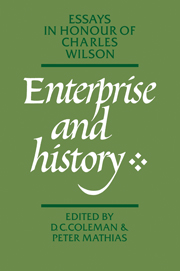Book contents
- Frontmatter
- Contents
- Preface
- List of contributors
- Part I Images and interpretations
- Part II England and the Low Countries in pre-industrial times
- 5 Bruges as a trading centre in the early modern period
- 6 English re-exports and the Dutch staplemarket in the eighteenth century
- 7 ‘Little London’: British merchants in Rotterdam during the seventeenth and eighteenth centuries
- 8 Prejudice and policy: Sir George Downing as parliamentary entrepreneur
- 9 The lawyer as businessman in eighteenth-century England
- Part III Enterprise, finance and politics in the modern world
- Bibliography of Charles Wilson's published works
- Index
8 - Prejudice and policy: Sir George Downing as parliamentary entrepreneur
Published online by Cambridge University Press: 12 March 2010
- Frontmatter
- Contents
- Preface
- List of contributors
- Part I Images and interpretations
- Part II England and the Low Countries in pre-industrial times
- 5 Bruges as a trading centre in the early modern period
- 6 English re-exports and the Dutch staplemarket in the eighteenth century
- 7 ‘Little London’: British merchants in Rotterdam during the seventeenth and eighteenth centuries
- 8 Prejudice and policy: Sir George Downing as parliamentary entrepreneur
- 9 The lawyer as businessman in eighteenth-century England
- Part III Enterprise, finance and politics in the modern world
- Bibliography of Charles Wilson's published works
- Index
Summary
Three hundred years after his death, Sir George Downing's personal reputation shows little sign of recovery. He remains today the fawning turncoat and meddling braggart presented to us by Bishop Burnet and the Earl of Clarendon. A steady trickle of calumny, fed from these fountain-heads of the Whig and Tory tradition, flowed unchecked through eighteenth- and nineteenth-century chronicles, officiously assisted by a handful of unfriendly memoirs such as Sir William Temple's, Lord Arlington's letters, or Governor Hutchinson's history of Massachusetts. For Laurence E(a)chard, for White Kennet(t), for James Ralph, Sir George Downing was merely the betrayer of Barkstead, Corbet and Okey, and the insolent incendiary who started two Dutch wars. For John Oldmixon he was something worse–‘an obscure New England fanatick’ whose manners ‘were as rude as those of an Iroquois, in whose neighbourhood he was bred’. So much for Harvard and the class of '42.
With the publication of Pepys's Diary in the 1820s this habit of disparagement was enlivened by a richer flood of anecdote, and Downing emerged not merely treacherous but also mean – «a niggardly fellow’ as well as ‘a perfidious rogue’. The modern currency of Pepys's account ensures that if Downing figures at all in the popular consciousness today it is as the grasping purveyor of bad faith and cold porridge, the jerry-building ‘Scoundrel Who Gave Us Downing Street’. Yet in fairness to Pepys it must be acknowledged that his natural loathing for Downing struggled unsuccessfully with a grudging admiration for one of his own kind, ‘a man of the old ways, for taking pains’, whose efficient pursuit of the public welfare he recognized and respected.
- Type
- Chapter
- Information
- Enterprise and HistoryEssays in Honour of Charles Wilson, pp. 135 - 150Publisher: Cambridge University PressPrint publication year: 1984
- 1
- Cited by



